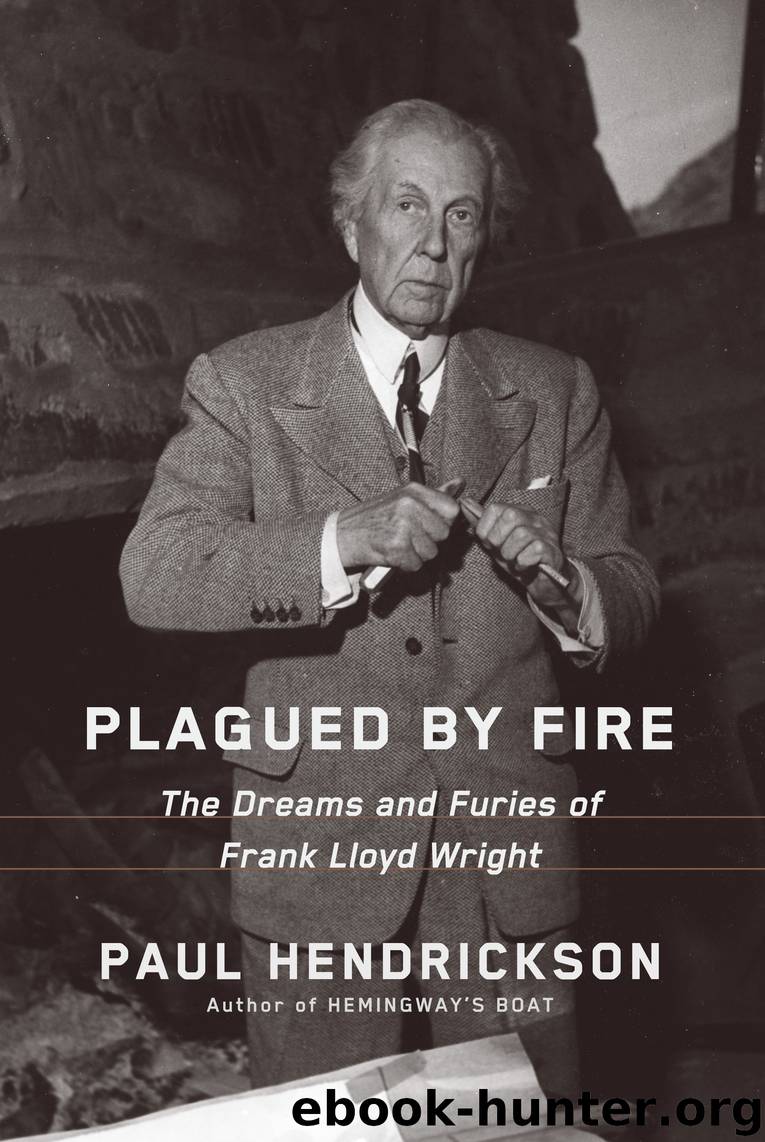Plagued by Fire by Paul Hendrickson

Author:Paul Hendrickson
Language: eng
Format: epub
Publisher: Knopf Doubleday Publishing Group
Published: 2019-09-30T16:00:00+00:00
* * *
And so to circle back once again to the uncircumscribable question: Why did he do it? He did it because he was mad. Gone berserk. All the rest is anybody’s argument, and has been, for a century. Some of the suppositions are daffy: he was put up to it, he was part of some kind of undefined conspiracy (possibly even involving Wright himself), he was overdue his back wages. (You attempt to destroy everyone and everything in sight because the master hasn’t given you your pay envelope for a week or two? Doesn’t parse, even for a madman, or a temporary madman.)
There is the long-running (and not quite parsable) theory that he had gotten it into his head that he was an “agent of the Lord,” and thus must destroy these wanton adulterers. In 1965, in a brief memoir-history-biography entitled The Valley of the God-Almighty Joneses, Wright’s adoring baby sister, Maginel Wright Barney, advanced this belief (those are her words, “agent of the Lord”), although she was hardly alone of his family with the theory. John Lloyd Wright, in the odd, crucial book that has been quoted several times, offered his own twist: “There were those of the clergy, too, who later from their pulpits used this tragedy as a moral lesson, calling forth endless expositions and quotations. I wonder if their previous criticism and prophecy of evil could have influenced the Barbados, who may have seen the possibilities for future glory for himself as the crime took shape in his warped mind.” It’s true that more than one Spring Green pulpit had railed against the sinners, although a lot of the railing had seemed to die down by the time Carlton struck. Wright biographer Robert C. Twombly addresses the pulpit-clergy-prompting theory in his 1979 book, Frank Lloyd Wright: His Life and His Architecture. Twombly’s is an important and deeply researched study, with which I often enough find myself disagreeing. But not at all with this sentence: “And the rumor that the superstitious Barbadian emigre had taken it upon himself to punish Wright’s ‘immorality,’ prodded by vindictive preaching at a local evangelical church, does not explain why he acted in the architect’s absence.” Precisely. And why would Julian have attended that church? He was black and possibly would not have been welcome. He was living out of town. He would have had to borrow a horse or a buggy, and that isn’t likely, although it’s more unlikely he would have gone in the first place—or have even known about such a church and service. And, besides, I don’t picture him a churchgoer, even if he was descended from churchgoers.
On Monday, August 17, forty-eight hours from the rampage, the Chicago Tribune printed an exchange from the day before between one of its reporters and Edwin Cheney. The reporter has caught up to Mamah’s former husband at the Spring Green rail depot. It’s Sunday midday. He’s going home, with the remains of his children in a little wooden box.
Download
This site does not store any files on its server. We only index and link to content provided by other sites. Please contact the content providers to delete copyright contents if any and email us, we'll remove relevant links or contents immediately.
| Actors & Entertainers | Artists, Architects & Photographers |
| Authors | Composers & Musicians |
| Dancers | Movie Directors |
| Television Performers | Theatre |
Cecilia; Or, Memoirs of an Heiress — Volume 3 by Fanny Burney(30935)
Cecilia; Or, Memoirs of an Heiress — Volume 2 by Fanny Burney(30890)
Fanny Burney by Claire Harman(25784)
We're Going to Need More Wine by Gabrielle Union(18074)
Plagued by Fire by Paul Hendrickson(16637)
Cat's cradle by Kurt Vonnegut(13868)
Bombshells: Glamour Girls of a Lifetime by Sullivan Steve(13109)
All the Missing Girls by Megan Miranda(12754)
Leonardo da Vinci by Walter Isaacson(11905)
4 3 2 1: A Novel by Paul Auster(11052)
Adultolescence by Gabbie Hanna(8145)
The remains of the day by Kazuo Ishiguro(7553)
Note to Self by Connor Franta(7024)
Diary of a Player by Brad Paisley(6867)
Giovanni's Room by James Baldwin(5880)
What Does This Button Do? by Bruce Dickinson(5529)
Recovery by Russell Brand(4566)
Born a Crime by Trevor Noah(4512)
The Kite Runner by Khaled Hosseini(4440)
